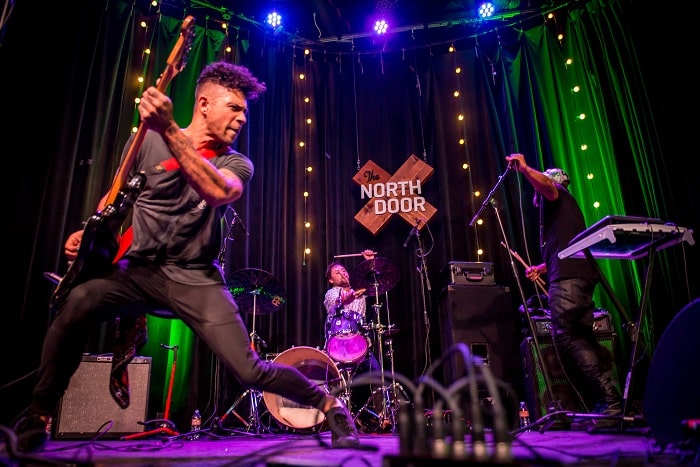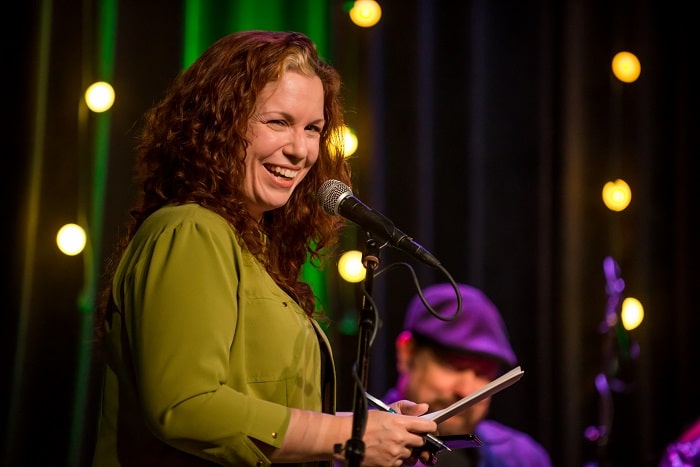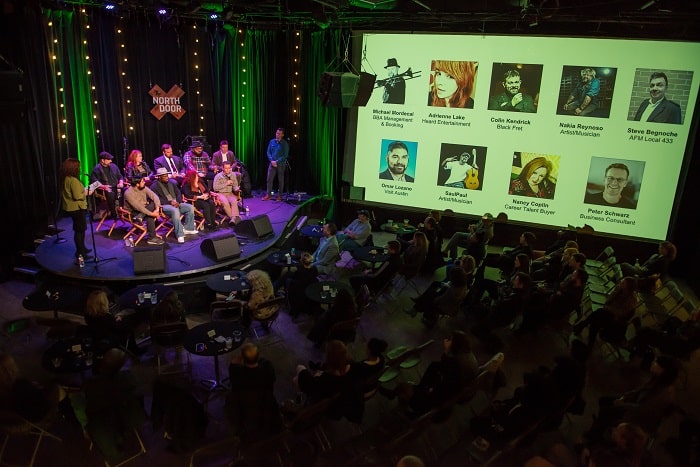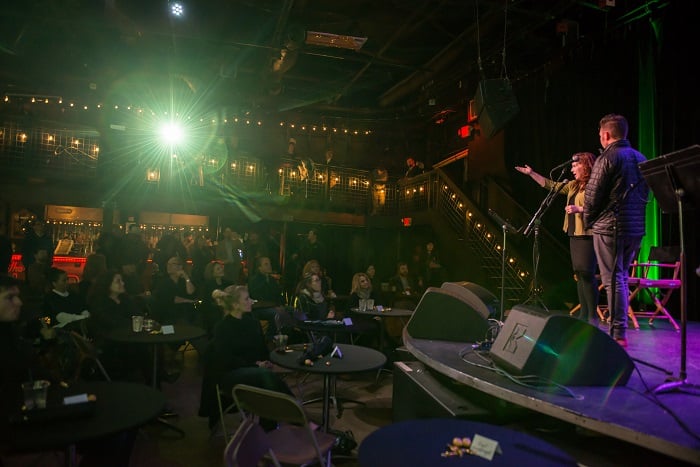
BLXPLTN tears apart The North Door during Musicians’ Living Wage kickoff event (Credit: Nicola Gell Photography)
Instead of a candy dish or ironic red stapler, imagine a tip jar on your work desk. In lieu of a paycheck, a manager swings by, smiles politely, and drops a couple of singles in your jar. Sadly, he isn’t able to actually pay you. You’re there for exposure.
If that scenario sounds insane to you, imagine what it must feel like to be a professional musician in Austin. Many venues are guilty of grossly underpaying artists in the Live Music Capital of the World. When Dale Watson leaves town because the rent’s too high and pay’s too low, then you know there’s trouble brewing.
In an attempt to do something about it, two music-fans-turned-advocates started Musicians’ Living Wage, an advocacy group dedicated to promoting equitable pay for local musicians. By bringing people together from every side of the issue, the team hopes to spark ideas and initiate change, through this unique and worthy endeavor.
Fans Turned Facilitators

Founding partner Debbie Stanley beams with pride during Musicians’ Living Wage kickoff event at The North Door (Credit: Nicola Gell Photography)
Local industry partners Brandon DeMaris and Debbie Stanley started Musicians’ Living Wage in early 2018. DeMaris’s concert production company was a client of Stanley’s music organization firm, and the two found common ground in the local music scene. As a musician himself, DeMaris felt drawn to the plight of local artists trying to earn a fair living.
After careful research and planning, the duo formed Musicians’ Living Wage. They started probing the live music landscape for opinions, pain points, and perspectives. What they found was a scene full of varying viewpoints all acknowledging the same issue: in order for the Austin music scene to thrive, musicians need to be paid fairly.
Bringing People Together

Musicians’ Living Wage united leaders and influencers from every corner of the Austin music scene to discuss fair pay for local musicians, during its kickoff at The North Door (Credit: Nicola Gell Photography)
It makes sense that the target benefactors would be the organization’s biggest supporters. Accordingly, artists like Nakia and SaulPaul took The North Door stage on Feb. 21, 2018, to discuss the importance of ensuring local artists get paid fairly to ply their trade.
But it wasn’t just musicians. Important figures from the local music scene, like Colin Kendrick (Black Fret) and Nancy Coplin (Founding Chair, Austin Music Commission) came to the table to discuss potential solutions. Rebecca Reynolds of Music Venue Alliance Austin, an advocacy group protecting the interests of local musicians, was there. Even representatives from music venues, those who stand to take a financial hit if changes are made, were well-represented.
And what would live music be without an audience? As fans themselves, DeMaris and Stanley welcomed input from those who’ll be paying the cover. From the get-go, the team modeled their approach after Black Fret, an organization that provides a platform for educated and motivated music lovers to “put their money where their mouth is,” and contribute to local music. The duo is also utilizing focus groups in an attempt to gather in-depth data on what’s needed to keep Austin music-making a viable profession.
➡ Keep reading: Do You Have What It Takes to Be a Musician in Austin?
Keeping the Conversation Going

Debbie Stanley and Brandon DeMaris greet an enthusiastic crowd at Musicians’ Living Wage kickoff at The North Door (Credit: Nicola Gell Photography)
The kickoff event is only the beginning. Musicians’ Living Wage aims to continue the momentum through social media. Its Facebook page has already been a hub of conversation and debate regarding the issue at hand. Additional panels and events are being planned for the future.
Another branch of community awareness is a podcast. The first two episodes are raw recordings from The North Door panel, with more content coming soon. Everything is about bringing Austin music stakeholders from every type and stripe to the table to hash out a solution.
“Seeing the panelists who came together, as diverse and experienced as they were, and watch them come out of their silos was a win,” shared Stanley. “They were meeting each other and having conversations they wouldn’t have had otherwise. It was a perfect microcosm of what we’re trying to do.”
If you ask an Austin outsider what we’re known for, the answer will probably be live music. Not breakfast tacos, Tex-Mex, or being the capital of the second largest state in the U.S. Live music bursting from every bar on Sixth Street is usually the answer.
So why can’t we financially support the world-class musicians who make Austin sing? The Musicians’ Living Wage movement hopes to answer that question by including everyone in the conversation, with a spirit of service and love for the heartbeat of our beloved city. Tip jars may always be a part of the professional musician’s lifestyle. Hopefully one day, he or she won’t have to pay the rent with them.
To learn more, visit Musicians’ Living Wage official website.
@BillTuckerTSP wants to know:
Where are your thoughts on fair wages for Austin musicians?
- Best Restaurants in Cedar Park: Local Favorites Worth the Drive - December 27, 2025
- Austin Volunteer Opportunities for the 2025 Holiday Season - December 17, 2025
- Austin Trail of Lights 2025 – Dates, Tickets & Zilker Park Guide - December 4, 2025

I think in a utopian world it would be great to have musicians paid more money. But that’s a slippery slope. I’m a photographer in Austin. Much like musicians we often work for only a mention. I bet the person who wrote this article did not get paid to do it. So why did you do it? Probably because this was something you felt passionately about so it was worth your time and energy.
Musicians by the boat load are willing to fill bars and halls every day of the week in Austin, including a few close family members who drive in from San Antonio just to play on 6th street. Why? Because it’s worth it to them.
Until musicians stop playing in mass for little money, why would anyone pay? Because it’s the right thing to do? There’s that Utopian society again. That’s not Austin or any other major city. Property owners pay premium dollars for property and get taxed out the wazoo for it. They aren’t going to pay people for a service that they are currently more than willing to show up for free.
And even if the city somehow got everyone together and got musicians paid a fair wage, where does that leave all the other artists? How do bartenders and waitresses get in on a big pay raise? How about street artists? Are they getting priced out of the ability to live downtown?
Where does it end?
How about construction workers? Taco trailer workers, Baristas? Teachers?